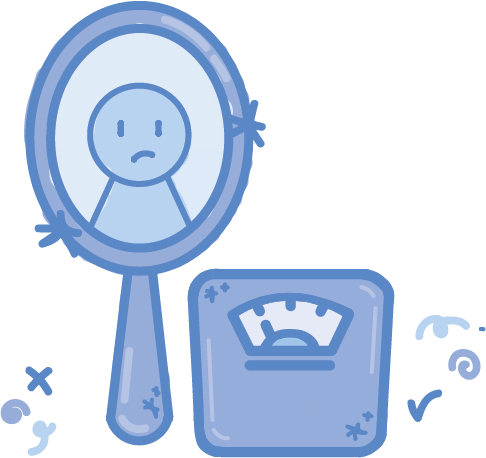For many students, their relationship with their body image is constantly at the forefront of their minds. In a poll of 115 students, 81% reported that they feel insecure about their bodies, and about 92% reported that they think about their body often. This issue can affect mental health, relationships, academic performance and many other areas of students’ lives. Senior Camryn Jamey* (he/they) was in elementary school when he was first bullied for his appearance. Although the bullying ended, it had lasting effects on Jamey’s self esteem. Even now, Jamey finds it difficult to have confidence in himself and his appearance.
“Having to constantly worry about my body image, you know, sometimes I compare myself to my friends. And this has definitely had a huge impact on my mental health. It’s gotten worse over the years to the point that sometimes I don’t even think I’m worthy of living,” Jamey said.
Junior Brielle Johnie* (she/her) said, as a result of dancing competitively for nearly 10 years, she’s continuously struggled with her body image. She said, particularly because of ballet, she feels an intense pressure to stay small and thin.
“Growing up in dance, I eventually developed disordered eating, and it’s still a problem that I have right now,” Johnie said. “I’m getting better, but it’s still something that I face. And it was really harmful for me, to the point I had to take some time off from school to work on it.”
Junior Paige Chikako* (she/her) also said her struggles with body image caused her to develop disordered eating habits, which sends her in spirals of guilt.
“Sometimes I don’t eat, or if I’m stressed, I eat more than I should. So there’s sort of this weird cycle of, if I need comfort, I’ll turn to food, but at the same time, I feel incredibly guilty about it. And then the next day, I might not eat breakfast. I don’t really know what my brain is doing,” Chikako said.
Johnie and Chikako both agreed that skipping lunch is a prevalent issue at Inglemoor. Johnie said that for students who struggle with their self image, seeing others eat less — or even skip meals — can be triggering.
“I’ve definitely noticed that there’s kind of a culture for people to not eat very much during the school day,” Johnie said. “A lot of times people will skip lunch or just buy a drink or a snack from the cafeteria vending machines. And it’s been hard because I start to think that’s all that people are eating, even though I don’t really know what they’re eating at home.”
All students interviewed attributed part of their negative relationship with body image to social media use. Chikako said the social media trend of “body checking” — when users examine their size, weight and shape in posts — has been harmful to her self esteem.
“You see other people on social media and are like ‘Oh, I want to look like them,’” Chikako said. “Even if they’re not trying to show off the way they look. Sometimes it’s really subtle. Like body checking. And sometimes it’s like they’re not even trying to. It’s just my brain telling me, ‘Oh my gosh, they look so much better.’”
Jamey also said that they’ve become more insecure in their body due to social media usage. He said the physical expectations for transgender men, which they often see promoted on platforms like TikTok, have caused them to feel less secure in their identity.
“I feel a lot from social media because I’m queer and I’m trans and nonbinary,” Jamey said. “There’s pressure to have this certain aspect. It’s skinny culture, and it encapsulates having to look super masculine in order to be considered non-binary.”
Junior Collin Cree* (xe/they/he) said xeir non-binary identity has complicated the way xey view xeir body. Cree said that negative self perception caused xem to develop mental health issues.
“I feel like my anxiety and depression kind of developed from that want to fit the societal norm,” Cree said. “But also, it really affected my sense of gender, because I feel that there’s definitely an expectation that women are supposed to be conventionally attractive. And then I’m non-binary. So even though I really want to be conventionally attractive, and meet all of that, I also didn’t want to look too feminine.”
Because of her poor mental health caused by her negative body image, Jonhie adopted a 504 plan. This provided accomodations such as extensions on assignments, and helped her manage school while recovering from anorexia.
“I think something that doesn’t get talked about is how body image can really frustrate you. Thoughts about my body image have really frustrated my brain, and they make it hard to concentrate on schoolwork,” Johnie said.
An additional aspect of body insecurity that Jamey believes is underrepresented is the stress of shopping for clothing. Jamey said that because he’s tall and typically wears larger sizes, it’s often hard to find clothes that fit right.
“I do sometimes cry when I go shopping, because it’s really hard to find clothes, especially ones that I really like. It’s probably something online, and if I order it and it doesn’t fit me, it really bothers me. I want to be able to dress the way I dress, but unfortunately, I don’t think our industry has developed enough to include everyone,” Jamey said.
While many students reported that their body image issues were self-inflicted, both Chikako and Johnie have also been in relationships that harmed their self-perception.
“I’ve been in some relationships with other people who experienced disordered eating, and so I compare myself to them sometimes, and there’s competition that goes on in my head, which is harmful, of course. And then I’ve also worried about looking good for people who I’ve dated in the past,” Johnie said.
While Chikako feels that her familial relationships haven’t had drastic impacts on her self image in the long run, as she’s gotten older, she’s realized that some family members’ comments about her body from an early age were extremely inappropriate. She said that as her younger sisters grew, she’s heard her family make similar comments about their bodies.
“When I was younger, my family, they wouldn’t say it to my face, but they’d say, ‘Oh, you should lose some weight’ because when I was younger and in middle school, I was a little bit bigger. And it didn’t bother me that much then, but now my mom says the same things to me about my sister. And it really does start to bother me that she says that because, you know, it’s her daughter. She should be happy for who she is,” Chikako said.
Cree, who struggled with his body image for years said that finding uplifting friends is their key to maintaining a healthy self image, and added that those who put others down are most likely dealing with their own insecurities.
“I tend to have a very ‘fake it till you make it’ attitude. If you wear what you want to wear and just have confidence, or pretend to have confidence, it’ll eventually develop into real emotion and real confidence,” Cree said. “So really, just be yourself.”
*students’ names have been changed for anonymity using a random name generator











